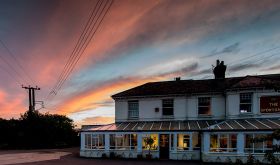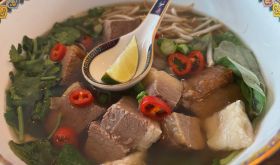As we turned off London's Piccadilly and headed north for dinner at Gymkhana, the latest restaurant to open at 42 Albermarle Street, I was worried on two different counts.
The first centred around quite how many restaurants had opened and closed in this particular location over the past 25 years. I could certainly cast my mind back to a time when Jams first opened here in the late 1980s with chef Jonathan Waxman, now based in New York, at its helm. Since then there have been numerous others and although I do not believe that there is such a phenomenon as a doomed site, I was somewhat anxious.
This sentiment was exacerbated by the fact that as we were about to cross the threshold, three builders skipped in front of us, walked past Paula, the restaurant's attentive receptionist, and headed for the service area behind the bar at the far end of the ground floor. Three builders on an emergency call out charge just after 8 pm comes to a hefty bill, one that can devour a significant proportion of that night's profits.
But for the next couple of hours, my brow and those of my guests remained completely untroubled as we were swept up in the atmosphere that chef Karam Sethi has created.
We ate spicy Indian food that was particularly fresh and clean, and reminded us in several instances of certain dishes we had enjoyed in Kerala, although it has to be said that we were grateful that the waiter took the hint and, rather than return to our table every few minutes with the porcelain jug of water, he left it on our table.
And we drank memorably well, too: a bottle of Malvazija Kozlovic 2012 (£32) from Istria, Croatia, was served by a Slovenian sommelier whom we had first encountered at Heston Blumenthal's Dinner and who sports a quasi-Mohican haircut.
Any concern about Gymkhana's potential longevity in this location I may have harboured were immediately waylaid by the fact that its ground floor and basement were packed and have been since it opened on 14 September. And on the basis of all we ate, Gymkhana deserves to flourish.
This is principally due to the sense of fun imbued by Sethi and his team. They have borrowed the name, Gymkhana, from that of the clubs the British established when they ruled the Indian subcontinent from 1858 to 1947 and used for sporting and social events.
Although this Gymkhana's food is far spicier, and the service much less deferential, this era provides a light-hearted backdrop to the design, particularly the black-and-white photos of cricket matches that line the staircase between the ground floor and basement.
The ground floor is more colonial in feel, home to a series of booths with large marble tables capable of housing the numerous side dishes that are part of any Indian meal, augmented by mirrors, fans and bergère chairs. Downstairs is noisier but clever lighting prevents it feeling like an annexe.
I was already a fan of Sethi's cooking as a result of what I had eaten at Trishna, his first restaurant in Blandford Street, Marylebone (a sister restaurant to Trishna, Mumbai), and particularly so at this time of the year when Sethi shows a particular talent for cooking game. Despite its uncharacteristically cheap plastic covering, Gymkhana's menu has plenty for game lovers: a partridge pepper fry; wild roe deer cooked with spices from Tamil Nadu in the far south; and a fiery vindaloo incorporating the muntjac deer that so many farmers now find such a nuisance.
My eye was immediately caught by the very first starter, a venison keema naan with cucumber and cumin raita that was first class, the meat soft and unctuous between layers of the warm bread. The kitchen's baking skills are excellent, as confirmed during a subsequent lunch. The first course of a scrambled duck egg bhurji, laced with lobster, came with a flaky, round malaba paratha, and was followed by diced goat with fenugreek leaves, £20, as in their two-course lunch menu. Both these dishes appear as 'nashta' or snacks on the dinner menu.
Shrimp and queen scallops cooked in the style of Amritsar in the Punjab were excellent but best of all was a dosa, a fermented crepe, with diced duck meat and coconut chutney, not just for its flavours but for the memories it evoked. The dosa reminded us of breakfasts of egg hoppers in Sri Lanka, and the whole dish reminded us of dinners on the rice boats of Kerala.
Our main courses were almost as good: prawns cooked in the north Indian lasooni style with red-pepper chutney; a chicken tikka with sprouting moong beans; and a most elegant presentation of a tandoori guinea-fowl breast, the leg meat diced and blended with a green-mango chaat.
I am afraid to say that I cannot use the adjective 'elegant' to describe the manner in which we fell on our desserts: a caramel custard enriched with jiggery, ultra sweet, unrefined sugar; a mango kheer, perhaps the original rice pudding; and a falooda, a sundae of saffron and pistachio topped with condensed milk.
Sethi has cleverly created a restaurant that delivers highly labour-intensive and flavourful dishes with style and wit. The price he will now have to pay is that he will have to spend far more time in Gymkhana's kitchens than with his new bride.
Gymkhana, 42 Albermarle Street, London W1S 4JH; tel +44 (0)20 3011 5900
The photo above is taken from the restaurant's website, where there is also a gallery of some of the very photogenic dishes served.













